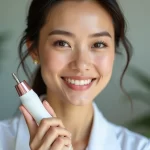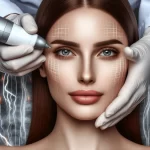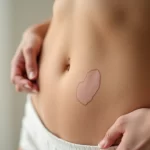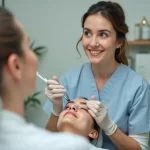Hair thinning is an essential factor nowadays. Almost every person is affected by this issue because of several factors worldwide. There are a lot of factors that contribute to this. In this article, we can discuss the connection between hormonal factors in hair thinning and hair health. Let’s explore and delve into the details of this issue.
Understanding about the Hair Growth:
It is important to realize the basics of hair growth to perceive how hormones regulate hair thinning. Hair growth happens in stages, such as the anagen (growth) stage, the catagen (transitional) stage, and the telogen (resting) stage. At any given time, an important proportion of hair follicles are in the anagen stage, which can last for a few years. The catagen stage is short, just a couple of weeks, although the telogen stage lasts a few months before the hair naturally happens and new growth sets out.
How Hormones Affect Hair Growth?
Hormones are chemical transmitters that influence numerous physiological actions, including hair growth. The fundamental hormones expected in hair development are androgens, estrogens, and thyroid hormones. If you are experiencing hair problems and have tried all the home remedies, then you should consult a Mobile dermatologist for the best possible solution.
- Androgens: Androgens, especially dihydrotestosterone (DHT), are the most important hormones involving hair growth. DHT is derived from testosterone through the enzyme 5-alpha-reductase. Although androgens boost hair growth in certain areas, such as the beard and underarms, they can have the inverse effect on scalp fuzz. High levels of DHT can cut the anagen stage, heading to hair follicles that make thinner, shorter hairs and finally cease growing hair completely. This procedure is known as androgenetic alopecia or male and female pattern baldness.
- Estrogens: Estrogens usually push hair growth and lead to the anagen stage. Many women feel thicker, better hair during pregnancy, as estrogen levels are high during that period. Conversely, during menopause, once estrogen levels go down, women frequently notice increased hair thinning and loss.
- Thyroid Hormones: The thyroid develops hormones that influence metabolic processes. Both hypothyroidism (hypoactive thyroid) and thyrotoxicosis (overactive thyroid gland) can interrupt the hair growth cycle. Hypothyroidism can lead to dry, breakable hair that tends to fall out, although thyrotoxicosis can cause hair thinning over the whole scalp.
Hormonal Factors in Hair Thinning:
You can get the best Hair loss treatment if you face hormonal imbalance or hormonal disorders that cause hair thinning. There are a lot of hormonal factors in hair thinning, such as:
- Polycystic Ovary Syndrome (PCOS): PCOS is a basic endocrine problem in women of reproductive age. It is characterized by raised levels of androgens, which can prompt hair thinning on the scalp and additional hair development on various body parts.
- Menopause: As cited earlier, the fall in estrogen levels during menopause can lead to evident hair thinning. The balance between androgens and estrogens changes, frequently leading to a gain in androgenic activity, negatively affecting scalp hair.
- Pregnancy and Postpartum: Hormonal variations during and after pregnancy can change hair growth. During pregnancy, elevated levels of estrogen draw out the anagen stage, prompting less hair shedding. After delivery, estrogen levels fall quickly, leading to a large number of fuzzes getting into the telogen stage at the same time, a state recognized as telogen effluvium.
- Thyroid Disorders: Both thyrotoxicosis and hypothyroidism interrupt the hair growth cycle. Treatment of the fundamental thyroid disorder commonly assists in rejuvenating normal hair growth, but it can take many months for evident improvement.
Diagnosing Hormonal Hair Thinning:
If you think that hormonal imbalances are causing your hair to thin, it is important to confer with a health professional. A complete medical history, active examination, and blood tests can help key out basic hormonal issues. Treatment for hormonal hair thinning frequently needs to address the basic hormonal imbalance. A few of the basic treatments include:
- Medicines: Medicines such as minoxidil and finasteride are generally prescribed for androgenetic alopecia. Minoxidil is a local treatment that assists in induced hair growth, although finasteride reduces the changeover of testosterone to DHT.
- Hormone Therapy: For women undergoing hair thinning due to menopause, hormone-replacement therapy (HRT) might be advised to balance estrogen levels. Even so, HRT has expected risks and should be discussed thoroughly with a health professional.
- Lifestyle Changes: A good diet, daily exercise, and stress management can positively affect hormone levels and general hair wellness. Nutritional insufficiencies, especially iron and vitamin D, can worsen hair thinning, so it is important to ensure enough consumption of these foods.
- Treatment for Thyroid Issues: The right management of thyroid concerns with medicine can assist in restoring native hair growth. Thyroid hormone replacement therapy for hypothyroidism or antithyroid drugs for thyrotoxicosis can treat hormone levels and further develop hair wellbeing.
- Anti-Androgen Medicines: In cases of PCOS or different conditions with raised androgen levels, medicines such as spironolactone or birth control pills can assist in bringing down androgen activity and understate hair thinning.
Hormonal factors play a critical role in hair thinning, and realizing this link can lead to more effective treatment and management procedures. If you are experiencing hair thinning, it is important to seek medical advice to check if hormonal imbalances are contributing to the condition.
Mobile Skin Screening for Hair Loss Treatment in Metro Phoenix, AZ:
If you have hormonal imbalances that lead to hair thinning or hair loss, you should seek medical treatment. If you are a Phoenix or nearby resident, you should consult Mobile Skin Screening for hair loss treatment in Metro Phoenix, AZ. You can get the best possible solution to your hair problems. They are as well provide other services like Skin tag removal, Warts removal, Mole removal, Laser acne treatment, Seborrheic Keratosis treatment, Keloid treatment, Period Acne, Pesky skin tags, and Pigmentation removal.
FAQs:
Q1: How do thyroid issues contribute to hair thinning?
Ans: Thyroid issues lead to hair thinning by interrupting the hair growth cycle, which can cause hair to become dry, breakable, and prone to falling out.
Q2: What is the impact of estrogen levels on hair health?
Ans: Estrogen levels affect hair wellness by boosting hair growth and holding out the anagen (growth) stage, heading to thicker and fuller hair.
Q3: Can hormone therapy help with hair thinning?
Ans: Yes, hormone therapy can assist with hair thinning by balancing hormone levels, especially in cases of menopause or hormonal imbalances.




